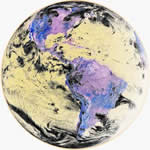Mikhail Bobovich and the Hot Summer Nights of Siberia
By Bob Kunzinger
Photos by Michael Kunzinger
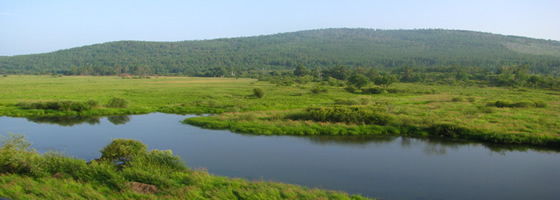
Michael and I rode in the passage between train cars on a clip through the birch forests of eastern Siberia. He played his harmonica; I watched the deep green landscape pass and rested from trying to talk to Alexander Ivanovich, our cabin mate, who was at that moment sleeping off a bottle of vodka and two cans of Baltika beer. Everything about this man justified the stereotype of the standard Russian image which Cold War kids like myself believed. He was right out of central casting: big gut, white tee-shirt, rough skin, bald but hairy eyebrows, and a taste for alcohol. And everything about the landscape contradicted the stereotype. In my mind Siberia was always frozen, unforgiving tundra. But in reality, in July, with temperatures in the high seventies, the blazing sun brings the rolling hills to life.
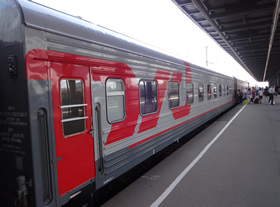
Our Russian language skills were minimal and Alexander’s was a rural dialect. The problem wasn’t that he didn’t know English but that he didn’t even know it was English we spoke. He thought we were from Spain.
But he talked. The alcohol absorbed his inhibitions and he spoke fast and strong and continuously, always smiling, pausing only to think of more to say. Every so often he’d shove a small glass at me and yell “Wodka Bob! Wodka!” and we talked to each other, the three of us, in our native tongues, not understanding but talking anyway. Still somehow by the time he left the train north of Vladivostok, we knew he drove a Kia, that the jewelry he purchased on a platform at one of the stations was for his daughter, that he had two granddaughters for whom he bought dolls, and he enjoyed sharing his dried fish and tea bags with us. We learned some Russian and he learned some English, and we were happy as hell when we all took pictures together.
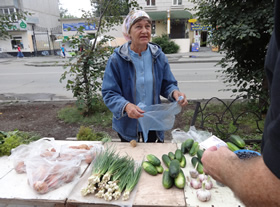
At one of the stations we bought dried fish and flat bread—Russian pizza really—from two young girls across a fence. I bought pierogis from an old woman who dumped a few dozen in a baggie for about fifty cents. Then we returned to the cabin and ate with Alexander Ivanovich, ordering shots of vodka and bottles of beer.
That was, after all, why we were there; these people and their stories. But it required breaks from the Slavic bath of too many consonants and not enough translation. So we stood between the cars in an enclosed passage where the rumbling of the tracks is a bit louder, and tunes like “This Land Is Your Land” and the theme from M*A*S*H echoed in the small steel passage.
And I looked at the rolling green hills of Siberia, and I thought of RISK. I grew up playing that game with my older brother. He usually won but I had fun moving my armies around the board, sometimes skipping from Kamchatka to Alaska, proving to me capture of the Russian coast was key in controlling the outcome. When Michael was growing up we did the same thing, and in the end I learned something valuable: that miserable game fucked up my sense of geography.
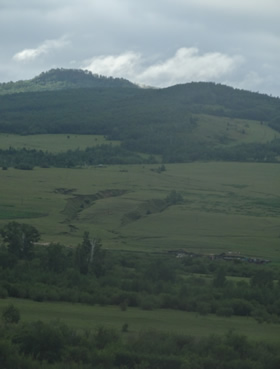
Siberia is not a country or a state; it is a region, like the American West, or heading out to the Plains. And Irkutsk is not a country but a city, and neither it nor its northern neighbor Yakutsk is east of Siberia but is in Siberia. The Ukraine does not take up most of map, doesn’t run from the Arctic to the Med, and doesn’t replace Russia, which this Soviet era game completely left off the planet.
Still, those far away places in beautiful colors with brightly colored armies became mythical. I grew up during the age of the evil empire, the Red Monster, Rocky Four. Siberia and Irkutsk might as well have been on the moon—I was never going. But it turns out I didn’t have to move armies to take Siberia; no opponents waited across Parker Brother’s boundaries. Decades of ignorance wiped out over a glass of Wodka and some shared pine nuts and dried fish. I didn’t roll doubles. I didn’t pull the wild cards. We just went.
But exploring Siberia was only part of the journey.
In Russia, a person’s name is a combination of his or her first name and a variation of the father’s first name, used as the offspring’s middle name. So Alexander’s father’s name was Ivan, hence Alexander Ivanovich. When he asked Michael his name, he repeated it in Russian—Mikhail. Then he asked my name. He stared at me quite some time repeating, “Bob. Bob. Bob.” Then he stared at Michael with a huge smile, pointed at him and said, “Ah! Mikhail Bobovich!” And so it was. Then he smiled and yelled, “Wodka, Mikhail Bobovich! Wodka!” shoving the small glass toward Michael.
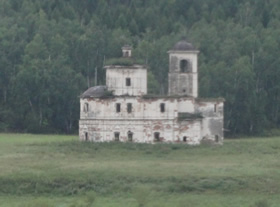
We headed south along the Amur River, China to the west, North Korea not far and Vladivostok at the end of the line another few days away. At one point we passed an abandoned mission on the other side of the border. This 19th century structure sat in the woods near the river like the last building left standing in an old ghost town, made more obvious by the dark green hills and the deep green and swollen Amur.
Anton Chekhov wrote, while riding the earliest of trains on these tracks, “I am in love with the Amur, and would be happy to stay here for a couple of years. It is beautiful with vast open spaces and freedom, and it’s warm. Switzerland and France have never known such freedom; the poorest exile breathes more freely on the Amur than the highest general in Moscow.” When Chekhov rode the Trans-Siberian rails to Vladivostok he took note more than a few times of the people and places that made him feel more welcome than the finest of characters in the most modern of houses.
I have Alexander Ivanovich, whose breath can set fire. Michael and I traveled over ten thousand miles from home to this point, and in the confines of our cabin, creeping past China and North Korea, suspended on rails above a flooded plain, I discover Chekov to be correct; we feel most free and welcome, and most abandoned of the turmoil and tethers of daily life in Alex’s company.
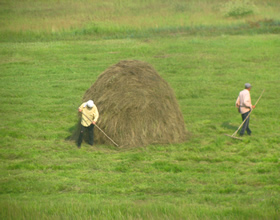
One morning he looked quietly out at the rain hitting the window and fell deep into some place that seemed to scare him. His eyes filled with anxiety and doubt. No one in Russia has ever asked me what I do for a living, and I wasn’t going to ask him. His bare feet were calloused beyond care, and his skin burned dark, his arms and legs muscular despite the beer gut. We wondered if he served time in one of the gulags we passed, some of which are abandoned and swallowed by the forest. Is he a guard? A mechanic? He looked out at the passing lands and I wondered if he was nervous about the floods we’ve been hearing might delay our approach to Vladivostok further down the line. It might delay him being able to see his family; or maybe he was nervous about seeing his daughter and granddaughters, the way he showed us their picture with such love wrapped in apprehension; the way he stared at it a long time; the way he wanted us to stare at it a long time.
When we did reach the flooded plain beneath the tracks and rolled past slowly, every passenger stood in the hallway wishing it through. When we made it past, Alexander nodded to acknowledge the victory, and smiled at Mikhail Bobovich and Michael smiled back.
Nothing in Siberia was what I had thought with its deep forests and rolling hills and warm fields of dark green grass; riverfront towns with festivals and cafes; and Alexander Ivanovich. Russia could have no finer ambassador.
I don’t set the best example for the safety and comfort of home that my son’s grandfather did for me. Still, the only danger in traveling is to not go in the first place. We roll the dice and hope for the best. There’s some strategy involved, of course, some degree of thinking ahead and knowing the consequences. But no one wins the game without crossing a few borders. There’s always some risk involved.
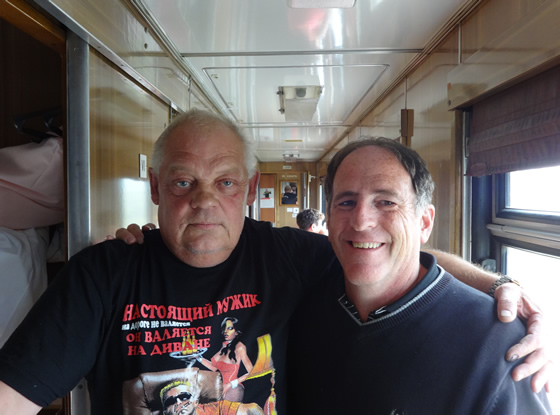
About the author

Bob Kunzinger is a non-fiction writer in Virginia. His work has appeared in numerous publications and has been noted several times by Best American Essays. He is at work on a book about Siberia and one about walking across Spain. Visit his blog: a view from this wilderness.
Did you like the article? Subscribe here to our New Article Email Alert or RSS feeds.
Sharing is caring! Don't forget to share the love, and keep the conversation going by leaving a comment below:
Advertisement
